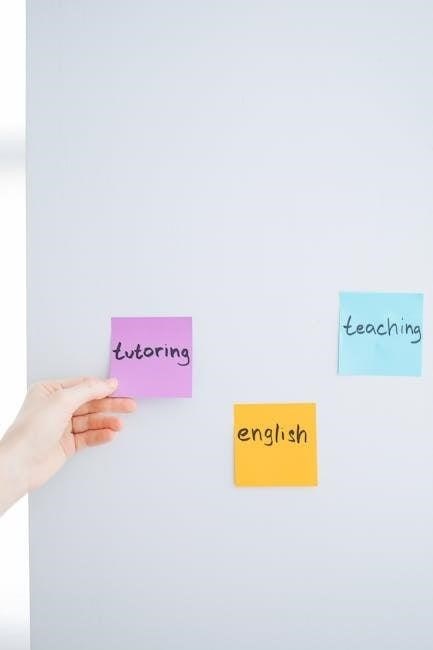Functional Skills English Level 2 is a qualification that focuses on practical communication skills‚ essential for everyday life and workplace scenarios. It covers reading‚ writing‚ speaking‚ and listening‚ ensuring learners can apply English effectively in real-life situations. This level is designed to build confidence and competence‚ preparing individuals for further education or career opportunities. The qualification is recognized nationally and is often required for progression in various fields.
1.1 Overview of Functional Skills English
Functional Skills English is a qualification designed to develop practical communication skills for everyday life and work. It covers reading‚ writing‚ speaking‚ and listening‚ focusing on real-life contexts. Available at various levels‚ it ensures learners can apply English effectively in personal and professional settings. This qualification is tailored to build essential skills‚ making it a foundation for further education or employment opportunities.
1.2 Importance of Level 2 in the Qualification Framework
Functional Skills English Level 2 is a pivotal qualification‚ bridging basic skills with advanced communication. It equips learners with the ability to handle complex texts‚ articulate ideas clearly‚ and apply English in professional settings. Recognized by employers and educational institutions‚ Level 2 enhances career prospects and serves as a stepping stone for higher-level qualifications‚ fostering personal and professional growth.
Structure of the Writing Component at Level 2
The writing component at Level 2 involves tasks like formal and informal letters‚ reports‚ and essays. Learners must complete 1-2 written responses‚ adhering to word counts and formatting guidelines.
2.1 Types of Writing Tasks Included
The writing tasks at Level 2 include formal and informal letters‚ reports‚ essays‚ and descriptive writing. These tasks assess the ability to communicate clearly and effectively for different purposes and audiences. Learners may write letters of complaint‚ job applications‚ or informal correspondence. Reports require structuring information logically‚ while essays test the ability to develop and support arguments. All tasks emphasize practical‚ real-life scenarios.
2.2 Word Count and Formatting Requirements
Writing tasks at Level 2 typically require 150-. Learners must adhere to clear formatting‚ such as using proper headings‚ paragraphs‚ and bullet points where appropriate. The focus is on clarity‚ conciseness‚ and presenting information in a structured manner. Correct use of spacing‚ margins‚ and font styles is also expected to ensure professionalism and readability in the final output.

Key Skills Assessed in Level 2 Writing
Functional Skills English Level 2 Writing assesses spelling‚ grammar‚ vocabulary‚ and clarity. It evaluates coherence‚ purpose‚ and audience awareness‚ ensuring effective communication through appropriate tone and style.
3.1 Spelling‚ Punctuation‚ and Grammar
Accuracy in spelling‚ punctuation‚ and grammar is crucial at Level 2. Learners must demonstrate control over sentence structure‚ correct use of commas‚ and proper spelling. Common errors‚ such as subject-verb agreement or misplaced apostrophes‚ can significantly impact clarity. Proper grammar ensures effective communication‚ while correct punctuation enhances readability. Regular practice with past papers and worksheets helps improve these skills.
3.2 Sentence Structure and Coherence
Effective sentence structure and coherence are vital for clear communication in Level 2 writing. Learners should use varied sentence lengths and structures to convey ideas logically. Proper use of conjunctions and linking words ensures smooth transitions between sentences. Clear and focused paragraphs help maintain the reader’s understanding. Practicing sentence construction and organizing ideas coherently are key to meeting the qualification standards.
3.3 Use of Vocabulary and Tone
The appropriate use of vocabulary and tone is essential in Level 2 writing. Learners should select words that accurately convey meaning and suit the context. Tone must align with the purpose‚ audience‚ and format of the writing. For example‚ formal letters require a professional tone‚ while informal writing may be more conversational. Practicing vocabulary expansion and understanding context clues enhances this skill‚ ensuring effective communication.

Marking Criteria for Level 2 Writing
Marking criteria assess clarity‚ structure‚ vocabulary‚ and grammar. Writing must demonstrate clear communication‚ logical organization‚ and appropriate language use to meet the required standards effectively.
4.1 How Marks Are Allocated
Marks are allocated based on spelling‚ punctuation‚ grammar‚ sentence structure‚ and vocabulary. Spelling and punctuation account for 20%‚ while sentence structure and coherence make up 30%. Vocabulary and tone contribute 50% of the total marks. Higher marks are awarded for consistent accuracy‚ clarity‚ and effective use of language to meet the task requirements.
4.2 Common Mistakes to Avoid
Common mistakes include poor spelling‚ punctuation errors‚ and grammar issues. Students often fail to address the question fully or structure their writing clearly. Overuse of simple sentences and informal language can reduce marks. Misunderstanding the task requirements is another frequent error. Ensuring thorough proofreading and planning before writing can help minimize these mistakes and achieve better results.

Sample Writing Questions and Answers
This section provides examples of writing tasks‚ such as formal and informal letters‚ reports‚ and essays. Each sample includes a question‚ model answer‚ and tips for improvement.
5.1 Formal Letter Writing Examples
Formal letters demonstrate clear structure and tone‚ suitable for professional or official purposes. Examples include job applications‚ complaints‚ or requests. Each letter should include your address‚ date‚ recipient’s details‚ salutation‚ purpose‚ and closing. Model answers show how to maintain formality while addressing the reader effectively. Practicing these examples helps learners master the layout and language required for formal communication.
5.2 Informal Letter Writing Examples
Informal letters are personal and conversational‚ often used to connect with friends or family. Examples include sharing news‚ planning events‚ or expressing opinions. Sample answers showcase how to maintain a casual tone while organizing thoughts effectively. These exercises help learners develop a natural writing style‚ focusing on clarity and personal expression in everyday communication.
5.3 Report Writing Examples
Report writing at Level 2 requires clear‚ factual‚ and structured content. Examples include writing about events‚ projects‚ or analyses. Sample answers demonstrate how to organize information logically‚ use appropriate language‚ and maintain objectivity. These exercises help learners develop analytical skills‚ ensuring their reports are informative‚ concise‚ and meet the intended purpose effectively.

Tips for Improving Writing Skills at Level 2
Practice regular writing exercises‚ focus on clarity and grammar‚ and review sample answers for structure. Use study guides and seek feedback to refine your techniques effectively.
6.1 Practicing Different Writing Styles
Mastering various writing styles enhances versatility. Practice formal letters‚ reports‚ and informal notes to build confidence. Analyze sample answers for tone‚ structure‚ and vocabulary. Regular exercises help adapt to different contexts‚ ensuring clarity and effectiveness in communication. This approach prepares learners for diverse writing tasks‚ improving overall English proficiency.
6.2 Using Online Resources and Worksheets
Online resources and worksheets are invaluable for improving writing skills. Utilize practice tests‚ interactive exercises‚ and downloadable guides to refine grammar‚ vocabulary‚ and structure. Websites offer sample answers‚ feedback tools‚ and progress trackers. Regular use helps identify weaknesses‚ builds confidence‚ and ensures readiness for assessments. These tools provide flexible learning opportunities‚ catering to individual needs and learning styles.

Common Challenges in Level 2 Writing
Common challenges include time management during exams and understanding question requirements. These issues often lead to incomplete or off-topic responses‚ affecting overall performance and accuracy.
7.1 Managing Time Effectively During the Exam
Managing time effectively during the exam is crucial for completing all tasks. Learners should allocate specific durations to reading‚ planning‚ and writing. Prioritize tasks to ensure all questions are attempted. Avoid spending too long on one question‚ as this can impact the ability to address others. Practice timed exercises to build confidence and efficiency.
- Review the entire paper first to understand requirements.
- Allocate time for planning and drafting answers.
- Move to the next question if stuck after a minute or two.
- Leave a few minutes for reviewing work before submission.
7.2 Understanding the Question Requirements
Understanding the question requirements is vital to producing relevant and effective answers. Learners must carefully read and interpret the task‚ identifying key words and instructions. This ensures responses align with what is being asked‚ avoiding unnecessary information. Practicing question analysis and breaking down complex questions can enhance this skill‚ leading to more focused and accurate writing.
- Identify the task type (e.g.‚ letter‚ report‚ essay).
- Highlight key words and instructions.
- Plan the structure to address all points.

Resources for Preparation
Utilize study guides‚ workbooks‚ and online platforms for practice tests. Interactive tools and video tutorials can enhance learning. Accessing past papers and sample answers is highly beneficial.
- Recommended workbooks for structured practice.
- Online platforms offering mock exams.
- Interactive tools for skill development.
8.1 Recommended Study Guides and Workbooks
Invest in reputable study guides and workbooks tailored for Functional Skills English Level 2. These resources provide structured practice exercises‚ model answers‚ and expert tips to improve writing skills. Popular options include workbooks from major educational publishers like Oxford University Press and Collins. They often include practice tests‚ progress trackers‚ and detailed feedback sections to help learners refine their abilities effectively.
- Look for guides with sample questions and answers.
- Choose workbooks offering clear explanations and examples.
- Utilize resources with focus on exam-style tasks;
8.2 Online Platforms for Practice Tests
Online platforms like BBC Bitesize‚ Skillsworkshop‚ and City & Guilds offer practice tests and resources for Functional Skills English Level 2. These platforms provide mock exams‚ sample questions‚ and interactive exercises to help learners prepare effectively. They often include answer keys and feedback tools to track progress and identify areas for improvement. Utilizing these platforms can significantly enhance exam readiness and confidence.
- Access practice tests tailored to exam standards.
- Benefit from immediate feedback and scoring.
- Engage with interactive exercises for better retention.

The Role of Feedback in Improvement
Feedback is essential for identifying strengths and areas needing improvement‚ guiding learners to refine their writing skills. Constructive feedback provides specific advice‚ enabling learners to understand and correct mistakes‚ leading to enhanced performance over time.
- Clarifies weaknesses and areas for development.
- Offers actionable insights for improvement.
- Builds confidence and promotes progress.
9.1 How to Use Feedback to Enhance Writing Skills
Feedback is a powerful tool for improving writing skills. Analyze the comments provided‚ identifying specific strengths and weaknesses. Use this information to address errors‚ refine sentence structure‚ and expand vocabulary. Implementing feedback effectively involves practicing targeted areas‚ seeking additional resources‚ and reflecting on progress over time to achieve continuous improvement.
- Analyze feedback to understand areas needing attention.
- Practice revising work based on specific suggestions.
- Use resources to address identified weaknesses.
9.2 Self-Assessment Techniques
Self-assessment involves evaluating your own writing to identify strengths and areas for improvement. Start by reviewing your work against the marking criteria‚ focusing on clarity‚ grammar‚ and coherence. Use checklists or rubrics to guide your evaluation. Set specific‚ achievable goals based on your findings and track your progress over time to refine your skills effectively.
- Review your work against the marking criteria.
- Identify specific areas needing improvement.
- Set and track progress toward achievable goals.

Success Stories and Case Studies
Learners achieving distinction in Functional Skills English Level 2 often share strategies like consistent practice and focused revision. Their success highlights the effectiveness of tailored study approaches and dedication to improving writing skills‚ inspiring others to pursue similar goals with confidence and determination.
10.1 Learners Who Achieved Distinction in Level 2 Writing
Many learners who achieved distinction in Level 2 Writing demonstrated exceptional command over grammar‚ spelling‚ and sentence structure. They consistently practiced with sample questions‚ utilized online resources‚ and sought feedback to refine their skills. Their success stories highlight the importance of dedication‚ effective study habits‚ and understanding the marking criteria to excel in the exam.
10.2 Strategies Used by Successful Candidates
Successful candidates employed structured approaches‚ such as creating detailed plans and using PEEL (Point‚ Evidence‚ Explain‚ Link) for coherent paragraphs. They practiced under timed conditions‚ reviewed sample answers‚ and focused on clarity and relevance. Regular self-assessment and seeking feedback were key strategies‚ ensuring their writing met the highest standards and aligned with the exam criteria effectively.

The Importance of Practice
Regular practice is crucial for improving writing skills‚ building confidence‚ and familiarizing oneself with exam formats. It helps identify weaknesses and refine techniques‚ ensuring better performance.
11.1 Regular Writing Exercises
Engaging in regular writing exercises helps develop fluency and accuracy. By completing tasks like essays‚ letters‚ and reports‚ learners can enhance their vocabulary‚ grammar‚ and sentence structure. Consistent practice also improves time management and reduces exam anxiety‚ ensuring they can articulate ideas clearly and coherently. This habit fosters confidence and prepares them for real-life communication challenges effectively.
11.2 Simulating Exam Conditions
Simulating exam conditions helps learners prepare for the actual test environment. By practicing under timed conditions and using past papers‚ learners can improve their time management and reduce exam anxiety. This approach familiarizes them with the exam format‚ enabling them to focus on demonstrating their skills effectively. Regular simulation builds confidence and ensures they are well-prepared for the assessment.
Final Tips for Exam Day
Stay calm and focused on exam day.
Arrive early‚ read instructions‚
manage your time‚
and review work before submission
for clarity and accuracy.
Present neatly.
12.1 Staying Calm and Focused
To stay calm and focused‚ practice deep breathing exercises before the exam.
Avoid cramming and ensure a good night’s sleep.
Use positive affirmations to boost confidence.
Skim through questions first to plan your approach.
Break tasks into smaller steps to maintain concentration.
Stay hydrated and energized with light snacks.
Remember‚ preparation is key to managing exam stress effectively.
12.2 Reviewing Work Before Submission
Always review your writing before submitting to catch spelling and grammar errors.
Ensure your response addresses all parts of the question.
Check for clarity and coherence in your arguments;
Make sure your work meets the word count and formatting requirements.
Taking a moment to review can significantly improve the quality of your submission and help you achieve a better grade.
Achieving Functional Skills English Level 2 is a significant milestone‚ equipping you with essential communication skills for real-life scenarios. Use this foundation to progress to higher levels or pursue further education and career opportunities. Accessing resources like writing samples and answer guides can support your continued development and confidence in English.
13.1 Progressing to Higher Levels
Completing Functional Skills English Level 2 opens doors to advanced qualifications‚ such as GCSEs or vocational courses. Learners can transition seamlessly‚ applying their improved skills in reading‚ writing‚ and communication. Utilizing resources like writing samples and answer guides helps bridge gaps and builds confidence for higher-level challenges. Regular practice and feedback are key to continued growth and success in more demanding academic or professional environments.
13.2 Applying Skills in Real-Life Scenarios
Functional Skills English Level 2 equips learners with practical abilities to handle real-life situations confidently. Skills like drafting emails‚ understanding workplace documents‚ and composing formal letters are invaluable in professional settings. These competencies also enhance daily tasks‚ such as filling out forms or communicating effectively with service providers. Real-world application ensures learners can navigate various scenarios with clarity and precision‚ making the qualification both relevant and impactful.
